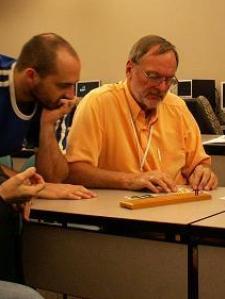
Ed M. answered • 07/24/16
Tutor
4.9
(40)
Help with grammar, French, SAT Writing, the TOEFL and ESL.
I see several problems with "It's huge message, i couldn't type" and not just in "sentence structure":
--The noun message is usually countable, and because here it's occurring in the singular form the rules of English grammar require that it be preceded by an indefinite article (a), a definite article (the) or some other determiner (e.g., my, his), in this case placed before the adjective huge which premodifies the noun.
--Since both "It's huge message" [sic] and "i couldn't type" [sic] are independent clauses, i.e., both have a subject (It and i [sic], respectively) and a finite verb ('s for is and could[n't], respectively), the rules of Standard Written English require that these not be separated by a comma--which would result in an error called a comma splice--but instead a type of end punctuation, e.g., a period or a semicolon.
--I agree with Kenneth S. about the need to capitalize i, though I note that in this text message-obsessed age (and indeed I suspect this is the kind of "message" your sentence is referring to) it's understandable how many people find it an unnecessary inconvenience to have to perform the extra step of hitting the Shift key or the equivalent to produce the standard capitalized I for the first person singular subject pronoun.
--The verb type can be transitive or intransitive (i.e., requiring a direct object or not, respectively), and in this context, i.e., coming after the first clause "It's huge message" [sic], I believe there is a clear suggestion of a meaning 'I couldn't type the message (because it's so huge)' for the second clause. On this interpretation, the usage of type here is clearly transitive, and the rules of English grammar require that an explicit direct object normally be stated for every transitive verb. So you could have given the second clause as I couldn't type the message, though much more likely instead of repeating the full noun phrase the message this would be replaced by the direct object pronoun it, yielding I couldn't type it.






Ria D.
07/24/16